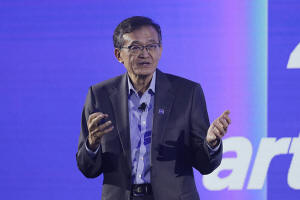Intel's stock tumbles after Trump says its CEO must resign
[August 08, 2025] By
MICHELLE CHAPMAN, DAVID KLEPPER and DIDI TANG
Shares of Intel slumped Thursday after President Donald Trump said in a
social media post that the chipmaker's CEO needs to resign.
“The CEO of Intel is highly CONFLICTED and must resign, immediately,”
Trump posted on Truth Social. “There is no other solution to this
problem. Thank you for your attention to this problem!”
Trump made the post after Sen. Tom Cotton sent a letter to Intel
Chairman Frank Yeary expressing concern over CEO Lip-Bu Tan’s
investments and ties to semiconductor firms that are reportedly linked
to the Chinese Communist Party and the People’s Liberation Army, and
asked the board whether Tan had divested his interests in these
companies to eliminate any conflicts of interest.
It's not immediately clear if Tan, who took over as Intel's CEO in
March, has divested his interests in the companies.
In a statement, Intel said it's “deeply committed to advancing U.S.
national and economic security interests and are making significant
investments aligned with the President’s America First agenda.”
“In March 2025, Intel appointed Lip-Bu Tan as its new CEO," Cotton wrote
in the letter. "Mr. Tan reportedly controls dozens of Chinese companies
and has a stake in hundreds of Chinese advanced-manufacturing and chip
firms. At least eight of these companies reportedly have ties to the
Chinese People’s Liberation Army.”
Cotton specifically called out Tan’s recent leadership of Cadence Design
Systems in the letter. According to the U.S. Department of Justice,
Cadence, in July, agreed to plead guilty to resolve charges that it
violated export controls rules to sell hardware and software to China’s
National University of Defense Technology, which is linked to the
Chinese military. Tan was the CEO of Cadence when the company violated
the rules between 2015 and 2021.

The U.S. Department of Commerce’s Bureau of Industry and Security also
fined Candence $95 million for the same breaches, saying Cadence
admitted that “employees of its Chinese subsidiary knowingly transferred
sensitive U.S. technology to entities that develop supercomputers in
support of China’s military modernization and nuclear weapons programs.”
Cadence did not immediately respond to AP requests.
Tan previously launched the venture capital firm Walden International in
1987 to focus on funding tech start-ups, including chip makers. China’s
state media has described Tan as “actively” devoted to Chinese and Asian
markets, having invested not only in the Taiwan Semiconductor
Manufacturing Company but also China’s state-owned enterprise SMIC,
which seeks to advance China’s chipmaking capabilities.

[to top of second column] |

Intel CEO Lip-Bu Tan delivers a speech during the Computex 2025
exhibition in Taipei, Taiwan, Monday, May 19, 2025. (AP Photo/Chiang
Ying-ying, File)
 The demands made by Trump and Cotton
come as economic and political rivalries between the U.S. and China
increasingly focus on the competition over chips, AI and other
digital technologies that experts say will shape future economies
and military conflicts.
Cotton, the chairman of the Senate Intelligence Committee, has
raised concerns that Chinese spies could be working at tech
companies and defense contractors, using their positions to steal
secrets or plant digital backdoors that give China access to
classified systems and networks.
On Thursday the Arkansas Republican wrote to the Department of
Defense urging Defense Secrectary Pete Hegseth to ban all non-U.S.
citizens from jobs allowing them to access DoD networks. He has also
demanded an investigation into Chinese citizens working for defense
contractors.
“The U.S. government recognizes that China’s cyber capabilities pose
one of the most aggressive and dangerous threats to the United
States, as evidenced by infiltration of our critical infrastructure,
telecommunications networks, and supply chains,” Cotton wrote in an
earlier letter calling on the Pentagon to conduct the investigation.
National security officials have linked China’s government to
hacking campaigns targeting prominent Americans and critical U.S.
systems.
“U.S. companies who receive government grants should be responsible
stewards of taxpayer dollars and adhere to strict security
regulations,” Cotton wrote on the social platform X.
Intel had been a beneficiary of the Biden administration’s CHIPS
Act, receiving more than $8 billion in federal funding to build
computer chip plants around the country.
Shares of the California company slid 3.5%, while markets,
particularly the tech-heavy Nasdaq, gained ground.
Founded in 1968 at the start of the PC revolution, Intel missed the
technological shift to mobile computing triggered by Apple’s 2007
release of the iPhone, and it’s lagged more nimble chipmakers.
Intel’s troubles have been magnified since the advent of artificial
intelligence — a booming field where the chips made by once-smaller
rival Nvidia have become tech’s hottest commodity.
Intel is shedding thousands of workers and cutting expenses —
including some domestic semiconductor manufacturing capabilities —
as Tan tries to revive the fortunes of the struggling chipmaker.
All contents © copyright 2025 Associated Press. All rights reserved |